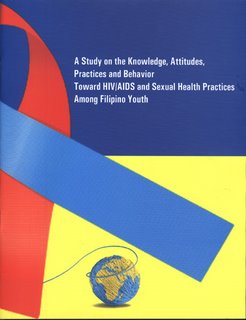
In 2005, HAIN conducted a study on the “Knowledge, Attitude, Behavior and Practices on HIV/AIDS among Filipino Youth and Health Workers”. This was project supported and was published this year by UNICEF.
The project aims to look at how today’s young people’s knowledge, attitude and behavior on SRH is influenced by other factors such as family relations, social influences, media exposure and involvement in non-sexual risk behaviors. It also looks at the delivery of reproductive health services to the youth, the availability and accessibility of youth-friendly services in health centers.
The data in this report serves as a baseline data and guide for UNICEF in designing HIV/AIDS and ARH programs and interventions in their selected sites.
The study covered 4111 youth and 216 health workers. The study was conducted in the National Capital Region (Quezon City, Pasay and Manila), Camarines Norte, Iloilo, Guimaras, Cebu, Negros Oriental, Davao, Maguindanao, Sarangani and Zamboanga.
The survey of youth aged 12-20 in the 12 UNICEF project sites brought up some interesting findings on the level of knowledge, attitudes and behaviors of young people regarding HIV/AIDS, condom, their sexual practice and utilization of reproductive health services.
Knowledge of HIV, AIDS and condom increases with age, and is high among those with high education and in school adolescents. Sixteen percent of youths in the survey are sexually active. More young people from the major urban cities have engaged in sex. The sexual activities include oral sex, anal sex, penetrative sex and same-sex sex. Condom use however is still low among sexually active youth. Results also show that younger youth are likely to use condom the first time, and this improved slightly with higher number of older youth using condom in their last sexual episode.
Similarly, the youth survey also found that there is greater confidence among young women to negotiate for condom use and decide on the timing and choice of their sexual partner, as well as discussing sexual issues with health service providers. This is a good indication that young people, especially the girls are becoming aware of their rights as regards information on sex related issues.

No comments:
Post a Comment